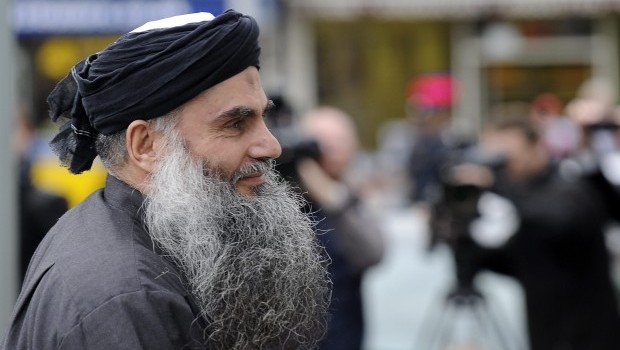Amman, AFP—Radical Islamist cleric Abu Qatada is to be flown from Britain to Jordan on Sunday, after the two governments approved a treaty paving the way for his deportation ending years of litigation, a Jordanian official said on Wednesday.
“Abu Qatada is expected to leave Britain in the early hours of Sunday and should arrive in the morning in Jordan on the same day,” a government official told AFP on condition on anonymity.
“He will arrive in Jordan on a military plane, escorted by Jordanian and British guards,” the official said without elaborating.
The radical Palestinian-born cleric has been fighting extradition to Jordan for years, although his representatives said he had finally reconciled himself to being deported to the kingdom which convicted him in his absence of terror charges in 1999.
Born Omar Mahmud Mohammed Otman in Bethlehem, Abu Qatada is Palestinian by birth but has Jordanian nationality because the West Bank city was controlled by Jordanian authorities at the time.
In 1999 he was condemned to death in Jordan for conspiracy to carry out terror attacks, including on the American school in Amman, but the sentence was immediately reduced to life imprisonment with hard labour.
In 2000, he was sentenced to 15 years for plotting to carry out terror attacks on tourists during the millennium celebrations in Jordan.
“We are optimistic. We hope that he will be taken to his home from the airport, directly. It is in nobody’s interest to keep him in jail,” Mohammad Shalabi, a Jordanian Salafist leader better known as Abu Sayyaf, told AFP.
“To my knowledge, his family will hire a lawyer for him. We are sure that he had nothing to do with what he was convicted of. We want him to arrive in Jordan safe and sound. God willing he will be declared innocent after a fair and quick trial.”
Detained without charge in Britain in 2002 and held in custody or under tight bail conditions ever since on the basis of intelligence assessments that he was a spiritual mentor for recruits to Al-Qaeda, Abu Qatada has never been prosecuted for any crime in Britain.
His lawyers took his case to European human rights judges who ruled earlier attempts to extradite him illegal on the grounds that evidence might be used against him that had been obtained by torture.
The treaty paving the way for his deportation was ratified last month by Jordan’s King Abdullah II and published in the official gazette on Monday.
The document, which was also approved by Britain, sets out statutory safeguards against the use of any testimony obtained under duress.
“I think Abu Qatada was convinced that he had Jordanian government guarantees that he will not face torture. That is why the deportation deal worked,” Hassan Abu Hanieh, expert on Islamist groups and issues, told AFP.
“I expect a retrial in the coming three years in line with European standards ensuring a fair trial. Britain is keen on that.”
The treaty does not specifically refer to Abu Qatada’s case but British Home Secretary Theresa May said in April that it should allay any remaining fears that tainted evidence might be used in any retrial for the 52-year-old cleric.
After the Jordanian announcement, Britain reiterated that it wanted to see Abu Qatada on a plane “at the earliest opportunity.”
A spokeswoman for the Home Office said she could not comment directly on operational security matters, but said: “Our focus is on seeing Abu Qatada on a plane to Jordan at the earliest opportunity.”
A Spanish judge once branded Abu Qatada the right-hand man in Europe of Osama bin Laden, although Abu Qatada denies ever having met the now slain Al-Qaeda leader.

